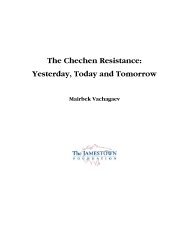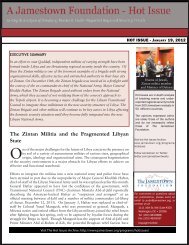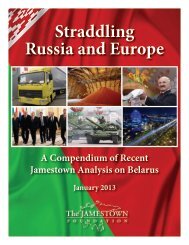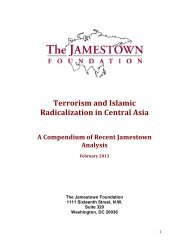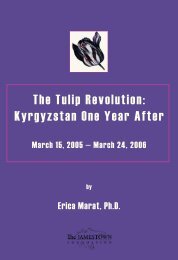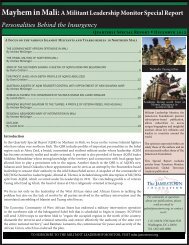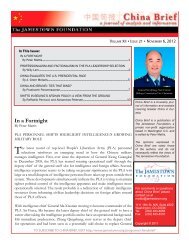By Brian Glyn Williams - The Jamestown Foundation
By Brian Glyn Williams - The Jamestown Foundation
By Brian Glyn Williams - The Jamestown Foundation
Create successful ePaper yourself
Turn your PDF publications into a flip-book with our unique Google optimized e-Paper software.
THE WESTERN FRONT<br />
Historian V. J. Parry has stated that:<br />
<strong>The</strong> raids made by the Tatars during the sixteenth and seventeenth centuries against their<br />
northern neighbors in Poland, the Grand Principality of Lithuania and Muscovy are of<br />
greater significance than their participation in conditions to which they were not suited in the<br />
Ottoman wars on the Danube. 106<br />
This summary is not completely accurate for the Tatars did have several advantages on this front that<br />
made up for the unfavorable conditions of this region. <strong>The</strong> Western Front, which for the purposes of this<br />
essay will include the buffer states of Moldavia, Wallachia and Transylvania and the Habsburg lands,<br />
was comprised of several distinct zones. <strong>The</strong> easternmost territories of the Budjak and Dobruca (coastal<br />
Bulgaria and Romania) were made up of flatlands that represented a continuation of the Eurasian<br />
steppe and thus facilitated the Tatars’ movements.<br />
Moving westward however the conditions deteriorated as the grasslands of the steppe were replaced by the<br />
oak and beech forests of the Carpathian mountains. It was in these valleys, writes William McNeill, that:<br />
a pastoral farming population survived; for in such a landscape Tartar horsemen and their<br />
bows were severely handicapped. Threatened communities could disperse into the woods<br />
and hide until raiders came by; and in case of large scale attack, local clan groupings<br />
among the Moldavians could gather together the fighting manpower of the principality and<br />
with the help of forest stockades and similar primitive but effective fortification could<br />
sometimes withstand cavalry attack quite successfully. 107<br />
Once past this difficult zone, the Tatars could move with greater freedom on the plains of the Great and<br />
Little Alfold of Hungary. This freedom of movement was hindered by the forests and Alpine valleys that<br />
confronted the Tatars when they passed Vienna. <strong>The</strong> conditions in and beyond the Wienerwald (Vienna<br />
Forest) were hardly suitable for the Khan's cavalry and many areas were thus rendered inaccessible to the<br />
Crimean raiders. <strong>The</strong> Tatars, as can be imagined, were more at ease making raids off the steppe into<br />
Wallachia and Moldavia than involving themselves in missions deep into the heart of the Christian West.<br />
In the early stages of the Ottoman-Tatar alliance, the Khan's forces were not actually required to<br />
participate in campaigns in the far west against the Hungarians. <strong>The</strong> Tatars were, however, used against the<br />
Principalities of Moldavia. Wallachia and Transylvania at an early date. <strong>The</strong> Tatars could be found operating in<br />
Moldavia as early as the year 1474 when Mengli Giray led a Crimean force against Stephen the Great to assist<br />
Mehemed II in his wars in this region. It was in fact Mengli Giray's predecessor's (Nurdevlet) earlier refusal<br />
to assist the Ottomans in this war that led to his removal as Khan. 108<br />
Mengli Giray proved himself to be worthy of the Sultan's support by continuing his assistance against the<br />
Moldavians. In 1484, he aided the Sultan Bayezid II in his conquest of the strategic Moldavian cities of<br />
Akkerman and Kilia. This important victory gave the Ottomans control of the Danube and Dniester basins<br />
and the Sultan was especially grateful for the Tatars' support. As a reward for his assistance, the Khan was<br />
given the permission to extend his territories across the steppe from Perekop right to Akkerman. <strong>The</strong><br />
Khan was also given the right to collect tribute from Moldavia and Wallachia, a gift that went a long<br />
28



